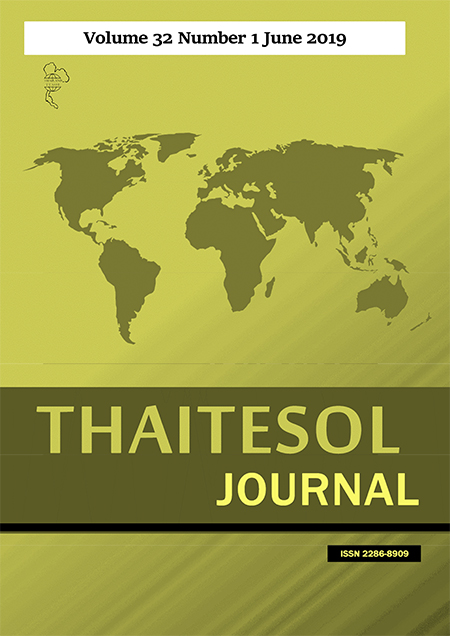Challenges Faced by Thai Tertiary Teachers in Designing and Delivering English Courses in the 21st Century
Main Article Content
Abstract
This study reports preliminary findings from an ongoing investigation which aims to identify the challenges Thai university teachers face in designing and delivering foundation English courses. It also aims to explore Thai teachers’ perceptions of the concept of 21st century skills: (1) how they perceive their readiness as teachers of the 21st century and (2) how they assess their capabilities to incorporate 21st century competencies into classroom materials and activities. The study involves 21 Thai and foreign teachers with different amounts of teaching experience who are teaching a Foundation English course for non-English majors at a Thai university in Bangkok. A mixed-method approach, which includes online questionnaire surveys and focus groups, is used to collect the data. Findings from this study have already found that there are some groups of teachers who are willing to adapt and change themselves to be part of the globalized world. The research data shows that the teachers understand the concept of 21st century skills, that they are capable of incorporating 21st century competencies into the classroom, and these have been reflected in what and how the teachers teach in their real practice. It is hoped that the findings of this study would encourage other teachers in the Thai tertiary context to see the possibility of embedding 21st century skills in the English language classroom as well as methods for designing Foundation English courses for Thai university students who are non-English majors.
Article Details
Materials in THAITESOL JOURNAL may be photocopied for educational purposes. Under no circumstances may any part of this journal be photocopied for commercial purposes.
References
Bialik, M., Bogan, M., Fadel, C., & Horvathova, M. (2015). Character Education for the 21st Century: What Should Students Learn? [PDF file]. Retrieved from
https://curriculumredesign.org/wp-content/uploads/CCRCharacterEducation_FINAL_27Feb2015.pdf
Bamrungsin, P. (2017). Enhancement Students’ Innovation and Learning Skills for the 21st Century and Thailand 4.0: A Case Study of Mahapajabati Buddhist College, Thailand. In W.A. Shipton (Ed.). The 5th International Scholars’ Conference Proceedings: Conduct Research with Passion, Purpose and Principle (pp.1-18). Bangkok: Darnsutha Press Company Limited. Retrieved from http://isc2017.apiu.edu/conferencepapers/others/Bamrungsin.Innovation.learning.skills.pdf.
Casner-Lotto, J., & Barrington, L. (2006). Are They Really Ready to Work?: Employers’ Perspectives on the Basic Knowledge and Applied Skills of New Entrants to the 21st
Century U.S. Workforce. Washington DC: Partnership for 21st Century Skills. [PDF file]. Retrieved from https://eric.ed.gov/?id=ED519465
Cooke, P. (2018, May 18). Is the Thai workforce ready for Thailand 4.0? Bangkok Post. Retrieved from https://www.bangkokpost.com/business/news/1467662/is-the-thaiworkforce-ready-for-thailand-4-0-.
Driscoll, M. (2017, September 7). Education in the 21st Century: The Value of a 21st Century Education. [Blog post]. Retrieved from https://thinkstrategicforschools.com/author/maxine/
Education First. (2018). EF English Proficiency Index 8th Edition. The world's largest ranking of countries and regions by English skills. Retrieved from https://www.ef.co.th/epi/.
Hixson, N., Ravitz, J., & Whisman, A. (2012). Extended Professional Development in Project-Based Learning: Impacts on 21st Century Teaching and Student Achievement.
Charleston, WV: West Virginia Department of Education. [PDF file]. Retrieved from https://www.academia.edu/1999374
McKinney, R. (2013, August 22). How can 20th century teachers lead 21st century learners? [Blog post]. Retrieved from http://www.wholechildeducation.org/blog/how-can-20thcentury-teachers-lead-21st-century-learners
Ministry of Education, Thailand. (2008). The Basic Education Core Curriculum B.E. 2551 (A.D. 2008). The Ministry of Education Thailand. Retrieved from:
http://www.act.ac.th/document/1741.pdf
National Research Council. (2012). Education for Life and Work: Developing Transferable Knowledge and Skills in the 21st Century. Washington, DC: The National Academies Press. [PDF file]. Retrieved from https://www.nap.edu/resource/13398/dbasse_070895.pdf
Office of Higher Education Commission (OHEC). (2014). Manual for the internal quality assurance for higher education institutions. [PDF file]. Retrieved from
http://www.mua.go.th/users/bhes/bhes2/56-12-7%20Manual%20for%20the%20Internal% 20Final.pdf
Office of Higher Education Commission (OHEC). (2017a). Education in Thailand. [PDF file]. Retrieved from https://www.bic.moe.go.th/images/stories/pdf/EDUCATION_IN_THAILAND_2017.pdf
Office of Higher Education Commission (OHEC). (2017b). Roles of the Office of Higher Education: Thailand 4.0. [PDF file]. Retrieved from http://www.atpac.org/wpcontent/
uploads/2017/07/5AD.-SGA1-ATPAC-2018-Eng-version-26.1.18-use-final.pdf.
Ongardwanich, N., Kanjanawasee, S. & Tuipae, C. (2015). Development of 21st Century Skill Scales as Perceived by Students. Procedia - Social and Behavioral Sciences, 191, 52 THAITESOL JOURNAL 32(1) 737-741.
Partnership for 21st Century Skills. (2007). Framework for 21st Century Learning. [PDF file]. Retrieved January 22, 2019 from http://www.p21.org/our-work/use-of-p21-content
Pheeraphan, N. (2013). Enhancement of the 21st Century Skills for Thai Higher Education by Integration of ICT in Classroom. Procedia – Social and Behavioral Sciences,
103(2013), 365-373.
Puncreobutr, V. (2016). Education 4.0: New challenge of learning. St. Theresa Journal of Humanities and Social Sciences, 2(2), 92-97. Retrieved from
http://www.stic.ac.th/ojs/index.php/sjhs/article/view/Position%20Paper3
Puncreobutr, V. (2017). The policy drive of Thailand 4.0. St. Theresa Journal of Humanities and Social Sciences, 3(1), 91-102. Retrieved from
http://www.stic.ac.th/ojs/index.php/sjhs/ article/view/114
Ravitz, J. (2014). A Survey for Measuring 21st Century Teaching and Learning: West Virginia 21st Century Teaching and Learning Survey [WVDE-CIS-28]. [PDF
file]. Retrieved from https://www.researchgate.net/publication/289377968
Saentaweesook, S. (2013). 21st Century Education: A New and Exciting Approach to Teaching. Retrieved 9 May 2019 from https://www.ajarn.com/blogs/ajarn-guests/21stcentury-education.
Santiboon, T. & Ekakul, P. (2017). Appropriating characteristics of the 21st century teacher to transform the Thailand 4.0 policies. European Journal of Education Studies, 3(5), 648-672.
Santos, J. M. (2017). 21st Century Learning Skills: A Challenge in Every Classroom. International Journal of Emerging Multidisciplinary Research, 1(1), 31-35.
Soparat, S., Rochanasmita , S. A., & Klaysom, S. (2015). The Development of Thai Learners’ Key Competencies by Project-based Learning Using ICT. International
Journal of Research in Education and Science (IJRES), 1(1), 11-22.
Vibulphol, J., Loima, J., Areesophonpichet, S., & Rukspollmuang, C. (2015). Ready Contents or Future Skills? A Comparative Study of Teacher Education in Thailand and
Finland. Journal of Education and Learning, 4(4), 149-159.
Whitby, T. (2016, December 8). We have 20th century teachers educating 21st century students: we must improve professional development. [Blog post]. Retrieved from
https://www.tes.com/news/we-have-20th-century-teachers-educating-21st-centurystudents-we-must-improve-professional
Wittayasin, S. (2017). Education Challenges to Thailand 4.0. International Journal of Integrated Education and Development, 2(2), 29-35.
Zuber, P. & Lynch, R. (2017). A Comparative Study of Student Academic Achievement and Satisfaction in Grade 4 Science under Traditional Instruction and Cooperative Learning Instruction Methods at Sarasas Witaed Bangbon School, Thailand. Scholar: Human Sciences, 9(1), 48-61.


